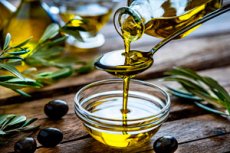New publications
I can't afford olive oil - what else can I use?
Last reviewed: 02.07.2025

All iLive content is medically reviewed or fact checked to ensure as much factual accuracy as possible.
We have strict sourcing guidelines and only link to reputable media sites, academic research institutions and, whenever possible, medically peer reviewed studies. Note that the numbers in parentheses ([1], [2], etc.) are clickable links to these studies.
If you feel that any of our content is inaccurate, out-of-date, or otherwise questionable, please select it and press Ctrl + Enter.

We have been hearing about the health benefits of olive oil for years. Many of us add it to salads, use it for baking and frying.
But during a cost-of-living crisis, such high prices can make olive oil unaffordable.
Let's figure out why olive oil is in demand, why it is so expensive now and what to do until prices drop.
Remind me why olive oil is so good for you? Including olive oil in your diet may reduce your risk of type 2 diabetes and improve heart health through better blood pressure, inflammation, and cholesterol levels.
This is mainly because olive oil is rich in monounsaturated fatty acids and polyphenols (antioxidants).
Some researchers have suggested that you can get these benefits by consuming up to 20 grams per day. That's equivalent to about five teaspoons of olive oil.
Why is olive oil so expensive now? Europe's heat and drought have limited the ability of Spanish and Italian producers to supply olive oil to international markets, including Australia.
Added to this was an unusually cold and short growing season for Australian olive oil producers.
Low production and supply of olive oil, coupled with increased demand from consumers, have led to rising prices.
How can you use olive oil more efficiently? Many households buy olive oil in large quantities because it is cheaper per litre. So if you still have some left over, you can extend its life by:
- Proper storage of oil - Make sure the lid is tightly closed and store the oil in a cool, dark place, such as a pantry or cupboard. When stored properly, olive oil can usually last 12-18 months
- use a spray - sprays distribute the oil more evenly than bulk bottles, using less olive oil overall. You can buy a spray bottle to refill from a larger jar as needed.
- Strain or freeze oil - If you have leftover olive oil from frying, strain it and use it for other fried dishes. You can also freeze this used oil in an airtight container, then defrost it and fry with it later without affecting the taste and other characteristics of the oil. But for dressings, use only fresh oil.
I'm out of olive oil. What can I use instead? Here are some healthy and cheaper alternatives to olive oil:
- Canola oil is a good alternative for frying. It is relatively low in saturated fat, so it is considered healthy. Like olive oil, it is rich in monounsaturated fats.
- Sunflower oil is a great alternative for salads or frying. It has a mild flavor that doesn’t overpower other ingredients. Some studies suggest that using sunflower oil may help reduce the risk of heart disease by lowering LDL (bad) cholesterol and raising HDL (good) cholesterol.
- Sesame oil - has a nutty flavor. It is suitable for Asian dressings and frying. Light sesame oil is usually used as a neutral cooking oil, while toasted sesame oil is used to flavor sauces. Sesame oil is rich in antioxidants and has anti-inflammatory properties. Sesame oil is usually sold in smaller bottles than canola or sunflower oil.
How can you use less oil at all? Using less oil when cooking can keep your meals healthy. Here are some alternatives and cooking techniques:
- Use baking alternatives - If your recipe calls for a lot of butter, try using alternatives such as applesauce, Greek yogurt, or mashed banana
- use non-stick cookware - using quality non-stick pots and pans reduces or eliminates the need for oil when cooking
- steam - steam vegetables, fish and poultry to lock in nutrients and moisture without adding oil
- Bake or fry - Potatoes, vegetables, or chicken can be baked or fried in the oven instead of pan-fried. You can still achieve a crispy texture without the need for a lot of oil.
- Grill - The natural fats in meat and vegetables can help keep ingredients moist without using oil.
- use broth - instead of frying vegetables in oil, try using vegetable broth or stock to add flavor
- try vinegar or citrus - use vinegar or citrus juice (such as lemon or lime) to add flavor to salads, marinades, and sauces without using oil
- Use natural moisture – Use the natural moisture in ingredients like tomatoes, onions, and mushrooms to cook without adding oil. They release moisture as they cook, helping to prevent sticking.
